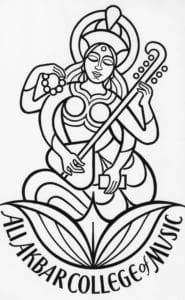Music is one of the best ways for channeling individual creative energy, but as a vehicle for shared cultural history, there is another layer of significance. The historical art form of classical music in particular depends on a dedication to its preservation and education. The Ali Akbar College of Music provides opportunities for students to hone their skills and learn Indian classical music using new, often unfamiliar media tools to receive quality music education.
 The music school’s mission takes direction from the legacy of its late founder, Maestro Ali Akbar Khan. A master sarode musician, his years of experience and teachings have been passed on to the primary instructors at the college. Establishing schools in three locations, Maestro Khan wanted to establish a school that offered beginner to professional level classes in North Indian classical music. While the college’s specialties are sarode, sitar, and tabla, students can also learn vocal techniques and specialize in an Indian or non-Indian instrument, including guitar, flute, cello, and violin.
The music school’s mission takes direction from the legacy of its late founder, Maestro Ali Akbar Khan. A master sarode musician, his years of experience and teachings have been passed on to the primary instructors at the college. Establishing schools in three locations, Maestro Khan wanted to establish a school that offered beginner to professional level classes in North Indian classical music. While the college’s specialties are sarode, sitar, and tabla, students can also learn vocal techniques and specialize in an Indian or non-Indian instrument, including guitar, flute, cello, and violin.
Mary Khan, Director and Library Manager, describes how the availability of modern classroom and content delivery technology opened new doors for the school’s burgeoning curriculum. After the passing of Maestro Ali Akbar in 2009, their expansion to live webinars was part of their first steps to modernize their program by integrating digital educational tools.
“As the world becomes more expensive, and learning becomes seemingly impossible to fit into our daily lives, having the ability to come home from work and turn on your computer to access classes will be more and more tempting,” says Khan. “For us at AACM, filling that niche with world class music lessons is fantastic.”
One of the issues that come with being a small, specialized music school is that there are many interested students who might not have the means to attend, and receive music classes in such a traditional setting. Opening their program to an online audience opens this niche and rare opportunity to students around the world.
Ali Akbar’s student body is comprised of aspiring professionals as well as hobbyists says Khan, with approximately a third of the college’s students being online. Classes are hosted on the Kannu LMS, where students view lesson videos, notation, and review materials. Since their introduction, the webinars have been an immediate success.
In transition to the new learning model, Khan ensured the foundation of their traditional teaching style was not compromised. Streaming webinars are conducted in live group classes, and the camera’s perspective is that of a student. This innovative approach makes the online classroom experience as close to the live teaching model as possible.
“The model has not really changed over the last 50 years. Typically, the lessons begin with exercises, then the teacher composes material on the spot, and the students learn the music orally, line by line. Written notation is not created until after the class has been taught.”
“We are all very surprised with the effectiveness of the webinars,” says Khan. We have a wonderful streaming program that has beautiful video and rich audio which helps tremendously. Instead of feeling cold and technical the students feel connected to their teachers.”
The achievements brought by the Ali Akbar College’s webinars reinforce the idea that online courses can result in a learning environment that’s more closely connected, shattering the misconception of technology being impersonal. Khan believes that it just takes the right equipment to create online programs for music colleges and enhance the wider educational experience. Music education can enrich a student’s life in ways other disciplines can’t, and advanced digital tools only accelerate that process. This comes with the recognition that technology in itself isn’t a barrier, but can be key to facilitating successful arts programs.
